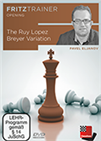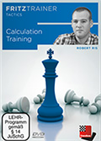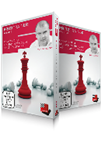Undefeated
The Ukrainian team, led by Anton Korobov and Andrei Volokitin, defeated Armenia in the final round to grab gold medals at the open section of the European Team Championships. The seventh seeds remained a bit under the radar throughout the tournament, as they did not get blowout wins and only joined the shared lead in round 7. However, they remarkably finished the event undefeated, both in matches and individual games!
 Pavel Eljanov explains in depth what Gyula Breyer already saw in 1911 and what became an opening choice of the likes of Kasparov, Kramnik, Anand or Carlsen. The Breyer Variation, which is characterised by the knight retreat to b8.
Pavel Eljanov explains in depth what Gyula Breyer already saw in 1911 and what became an opening choice of the likes of Kasparov, Kramnik, Anand or Carlsen. The Breyer Variation, which is characterised by the knight retreat to b8.Ukraine arrived in Slovenia without the likes of Pavel Eljanov, Vasyl Ivanchuk and Yuriy Kryvoruchko, but nevertheless presented a strong, experienced team, with four players aged over 30 joined by 19-year-old Kirill Shevchenko, who came from winning the strong Lindores Abbey Blitz Tournament in Riga.
None of the Ukrainian representatives had a particularly stellar performance (three of them in fact lost rating points), but good team strategy and enviable consistency ended up giving them the gold medals. The strongest performer in the squad was Volokitin, who scored 6 out of 8 points in Terme Čatež.
This is Ukraine’s first-ever gold medal at the European Team Championship. They had twice won bronze and twice won silver. In 2019, they finished in second place behind Russia.

Ukraine’s Andrei Volokitin
The eventual champions got off to a great start on Sunday, as Korobov obtained a 23-move win over Armenia’s Gabriel Sargissian on top board.
Sargissian’s offer to exchange queens with 19...Qa4 was the losing mistake, as it allowed White to decisively activate his pieces on the kingside after 20.Qxa4 Nxa4 21.Bf6 Rc2 22.h4
 This DVD emphasizes the importance of training your calculation skills. Dutch IM Robert Ris made a selection of training material which he uses in lessons with students ranging from 1400 to 2400.
This DVD emphasizes the importance of training your calculation skills. Dutch IM Robert Ris made a selection of training material which he uses in lessons with students ranging from 1400 to 2400.
White’s dark-squared bishop and rook on the h-file create a devastating threat on h8 against the vulnerable king. Sargissian played 22...g4, trying to keep things closed, only to see the other rook join the action with 23.Rd4, and if Black wants to avoid a quick attack, he will need to give up his knight on a4 — Sargissian resigned.
Volokitin also finished the tournament with a win, as he outplayed Haik Martirosyan in a sharp struggle on board 2.
Ukraine vs. Armenia
Select an entry from the list to switch between games
Firouzja crosses 2800, France get silver
Ukraine’s victory was not certain until the very end of the tournament, as they tied on points with France after Alireza Firouzja beat Shakhriyar Mamedyarov to give the French team match victory. The first tiebreak criterion favoured the Ukrainians, which meant France got to return home with silver medals.
While it was all about consistency in Ukraine, France had more ups and downs during the nine days of competition. They lost to Hungary and Armenia in rounds 3 and 5 respectively, but managed to make a comeback with four consecutive victories after the rest day.
 The individual performances in the French team were also rather uneven, with four out of their five representatives losing Elo points at the 9-round event. The one that did gain rating points, though, was the star of the tournament — Firouzja scored 8 out of 9 points for a stratospheric 3015 tournament rating performance!
The individual performances in the French team were also rather uneven, with four out of their five representatives losing Elo points at the 9-round event. The one that did gain rating points, though, was the star of the tournament — Firouzja scored 8 out of 9 points for a stratospheric 3015 tournament rating performance!
Firouzja’s incredible performance follows his triumph at the Grand Swiss in Riga, which granted him a spot in the next Candidates Tournament. Moreover, now that he gained 33.8 rating points in these two events, there is a real chance that he will play the Candidates as the rating favourite, as he climbed to second place in the world ranking and became the youngest ever player to cross the 2800-rating barrier — Magnus Carlsen had surpassed that threshold at 18 years, 11 months and 2 days, while Firouzja will do it at 18 years, 5 months and 13 days!
We all kind of knew a while back that the Iranian-born grandmaster was destined for greatness, but the youngster has more than delivered — and quicker than expected!
[Photo: Vladimir Jagr, Prague Masters]
France vs. Azerbaijan
Select an entry from the list to switch between games
Bronze medals for Poland
Two teams won in round 9 to end the event a point behind the leaders — Spain and Poland. While Spain took down the Netherlands thanks to a win by David Anton, Poland got the better of Georgia, scoring a commanding 3½-½ victory with wins by Jan-Krzysztof Duda, Radoslaw Wojtaszek and Wojciech Moranda.
 These DVDs are about Understanding Middlegame Strategies. In the first DVD dynamic decisions involving pawns are discussed. The second DVD deals with decision making process concerning practical play.
These DVDs are about Understanding Middlegame Strategies. In the first DVD dynamic decisions involving pawns are discussed. The second DVD deals with decision making process concerning practical play.The massive win ended up granting Poland a better tiebreak score than their Spanish colleagues. Duda and Moranda had the strongest performances for the Polish team.
The Spanish squad should be happy with their showing in Slovenia, though, as they were the only team other than Ukraine to finish the event undefeated. On top boards, Alexei Shirov and David Anton had strong performances, with both coming from having a good tournament in Riga — combining both events, Shirov and Anton climbed 25 and 21 places in the live ratings list, respectively.

The Polish squad
Final standings - Open
| 1 |
7 |
|
Ukraine |
9 |
5 |
4 |
0 |
14 |
212,5 |
21,5 |
| 2 |
3 |
|
France |
9 |
7 |
0 |
2 |
14 |
207,5 |
21,5 |
| 3 |
4 |
|
Poland |
9 |
5 |
3 |
1 |
13 |
192,5 |
22,5 |
| 4 |
8 |
|
Spain |
9 |
4 |
5 |
0 |
13 |
190,0 |
20,0 |
| 5 |
2 |
|
Azerbaijan |
9 |
4 |
4 |
1 |
12 |
224,0 |
21,5 |
| 6 |
1 |
|
Russia |
9 |
5 |
2 |
2 |
12 |
206,5 |
20,5 |
| 7 |
11 |
|
Armenia |
9 |
4 |
4 |
1 |
12 |
206,0 |
21,0 |
| 8 |
13 |
|
Serbia |
9 |
6 |
0 |
3 |
12 |
160,5 |
20,0 |
| 9 |
6 |
|
Netherlands |
9 |
4 |
3 |
2 |
11 |
175,5 |
20,5 |
| 10 |
9 |
|
Germany |
9 |
5 |
1 |
3 |
11 |
167,0 |
21,0 |
| 11 |
25 |
|
Georgia |
9 |
4 |
2 |
3 |
10 |
162,5 |
18,0 |
| 12 |
15 |
|
Israel |
9 |
3 |
4 |
2 |
10 |
158,5 |
20,0 |
| 13 |
5 |
|
England |
9 |
3 |
4 |
2 |
10 |
154,5 |
19,0 |
| 14 |
20 |
|
Greece |
9 |
5 |
0 |
4 |
10 |
152,0 |
19,5 |
| 15 |
14 |
|
Croatia |
9 |
3 |
4 |
2 |
10 |
148,5 |
19,0 |
...39 teams
All games - Round 9
Replay all games at Live.ChessBase.com
Russian women cannot stop winning
Despite securing tournament victory with a round to spare, the Russian women’s team finished the event with yet another win, beating Poland by a 2½-1½ score thanks to the full points achieved by Kateryna Lagno and Alina Kashlinskaya.
Similarly, Georgia, which had secured second place after Saturday’s eighth round, finished the tournament with a win.
With seven teams going into round 9 tied on 10 points, the most intriguing question in the women’s tournament was which team would end up getting bronze medals. In the end, it came down to tiebreaks, as Ukraine and Azerbaijan won their matches to finish the tournament on 12/18 points — Azerbaijan had a better Sonneborn-Berger score and thus finished on the third step of the podium.

A perfect 18 out of 18 score gave Russia their fourth consecutive European title | Photo: Artem Pugachev
Final standings - Women’s
| 1 |
1 |
|
Russia |
9 |
9 |
0 |
0 |
18 |
272,5 |
29,0 |
| 2 |
3 |
|
Georgia |
9 |
7 |
1 |
1 |
15 |
215,0 |
22,5 |
| 3 |
5 |
|
Azerbaijan |
9 |
5 |
2 |
2 |
12 |
196,0 |
22,0 |
| 4 |
2 |
|
Ukraine |
9 |
5 |
2 |
2 |
12 |
187,0 |
20,0 |
| 5 |
7 |
|
Germany |
9 |
5 |
1 |
3 |
11 |
153,5 |
21,0 |
| 6 |
12 |
|
Serbia |
9 |
4 |
3 |
2 |
11 |
150,5 |
21,5 |
| 7 |
4 |
|
Poland |
9 |
4 |
2 |
3 |
10 |
194,5 |
19,5 |
| 8 |
14 |
|
Netherlands |
9 |
4 |
2 |
3 |
10 |
178,5 |
21,5 |
| 9 |
13 |
|
Italy |
9 |
4 |
2 |
3 |
10 |
175,5 |
19,0 |
| 10 |
6 |
|
France |
9 |
4 |
2 |
3 |
10 |
170,5 |
20,0 |
| 11 |
8 |
|
Armenia |
9 |
4 |
2 |
3 |
10 |
167,0 |
20,0 |
| 12 |
11 |
|
Hungary |
9 |
3 |
4 |
2 |
10 |
153,0 |
20,0 |
| 13 |
18 |
|
Greece |
9 |
5 |
0 |
4 |
10 |
137,5 |
16,5 |
| 14 |
10 |
|
Romania |
9 |
4 |
1 |
4 |
9 |
166,0 |
20,0 |
| 15 |
17 |
|
Slovakia |
9 |
3 |
3 |
3 |
9 |
134,0 |
18,0 |
...31 teams
All games - Round 9
Replay all games at Live.ChessBase.com
Links
























